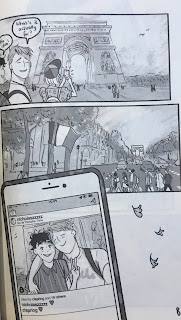What a delight this quirky little Danish novel is! I came across Dorthe Nors in the first story I read from Found in Translation last week. I had decided to read the 20 short stories written by women in this collection for Women in Translation Month #WITMonth. And I was very quickly off to an auspicious start with Dorthe Nors' She Frequented Cemeteries (from the short story collection Karate Chop).
I enjoyed the writing and translation of She Frequented Cemeteries so much that I searched for anything by Dorthe Nors on Audible. And there I found Mirror, Shoulder, Signal. A few days later I was downloading it. And what an utter delight it is!
Sonja is 40 something. She lives alone in Copenhagen, and works as a translator of Stieg Larsson style Swedish crime fiction novels, violent tomes with many murdered women strewn about the Swedish countryside. Sonja grew up on a Danish farm among the rye fields in remote Jutland. She has vivid childhood memories of playing in the rye fields, and the calls of the Whooper Swans are evocative. She reminded me somewhat of Eleanor Oliphant with less vodka and less childhood trauma. Sonja is afflicted with BPPV as is her mother. It was fascinating to see this condition used in a story.
There are a small cast of supporting characters, Sonja's two driving instructors at her driving school where a lot of the action of the book happens, Ellen, Sonja's New Age masseuse, and her friend Molly who is a psychologist and overshares about her patients.
and Molly proceeds to talk about her clients. Sonja's certain that that's forbidden but noone's very concerned about oaths of confidentiality anymore. The private has become so trivial and pawed over anyway, and who cares? So she sits there and watches Molly expand on someone else's catastrophe.Sonja has become estranged from her family, and she mulls over them and her rural origins. She writes cards and letters to them that she will never post.
The place you come from is a place you can never return to.There is much humour to be had in Mirror, Shoulder, Signal, something that is not always easy to achieve in translated fiction. Or in any fiction to be fair. A large part of this must come down to the considerable skill and wonderful translation by Misha Hoekstra (@mishap). The last chapter and especially the very last few pages/minutes of the book confused me somewhat. I went back and listened to the last chapter to see if I had missed something, but I don't think I did. This was a mere quibble really and not enough to staunch my joy at finding this wonderful book, and an intriguing new author. One that I hope will become a firm favourite. I ordered all her books today! I can only imagine that I'll love them all.
Denmark is rather high on my travel wish list. Not that I know all that much about it really. Princess Mary. Hygge. Hans Chrisitian Andersen. No-one is travelling internationally in 2020, and I can't imagine I'll be travelling anywhere like Europe before 2022 and yet I was able to spend a delightful few days driving around Copenhagen with Sonja.
I really enjoyed Kate Rawson's delightful narration. Although it feels a bit odd when she slips into rural British accents for the rural Danish characters. Her pronunciation of many Danish place names and words seems very good to my uneducated ear. I always enjoy it when the narrators can seamlessly pronounce the meaningful words of the text.
Mirror, Shoulder, Signal has many echoes of She Frequented Cemeteries, both female characters like to spend time in the lonely, quiet parts of cemeteries as they hide away from friends, family and the modern world.
Dorthe Nors writes fiction in Danish, and essays in English!
Dorthe has given us her Top 5 reasons to go to Denmark



















